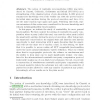Free Online Productivity Tools
i2Speak
i2Symbol
i2OCR
iTex2Img
iWeb2Print
iWeb2Shot
i2Type
iPdf2Split
iPdf2Merge
i2Bopomofo
i2Arabic
i2Style
i2Image
i2PDF
iLatex2Rtf
Sci2ools
98
Voted
EUROCRYPT
2009
Springer
2009
Springer
Resettably Secure Computation
Abstract. The notion of resettable zero-knowledge (rZK) was introduced by Canetti, Goldreich, Goldwasser and Micali (FOCS'01) as a strengthening of the classical notion of zero-knowledge. A rZK protocol remains zero-knowledge even if the verifier can reset the prover back to its initial state anytime during the protocol execution and force it to use the same random tape again and again. Following this work, various extensions of this notion were considered for the zero-knowledge and witness indistinguishability functionalities. In this paper, we initiate the study of resettability for more general functionalities. We first consider the setting of resettable two-party computation where a party (called the user) can reset the other party (called the smartcard) anytime during the protocol execution. After being reset, the smartcard comes back to its original state and thus the user has the opportunity to start interacting with it again (knowing that the smartcard will use the same se...
Cryptography | EUROCRYPT 2009 | PPT Computable Functionalities | Resettable Two-party Computation | Two-party Computation Protocol |
Related Content
| Added | 24 Nov 2009 |
| Updated | 24 Nov 2009 |
| Type | Conference |
| Year | 2009 |
| Where | EUROCRYPT |
| Authors | Vipul Goyal, Amit Sahai |
Comments (0)

